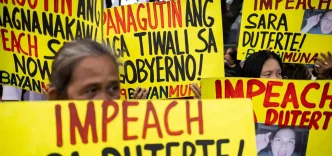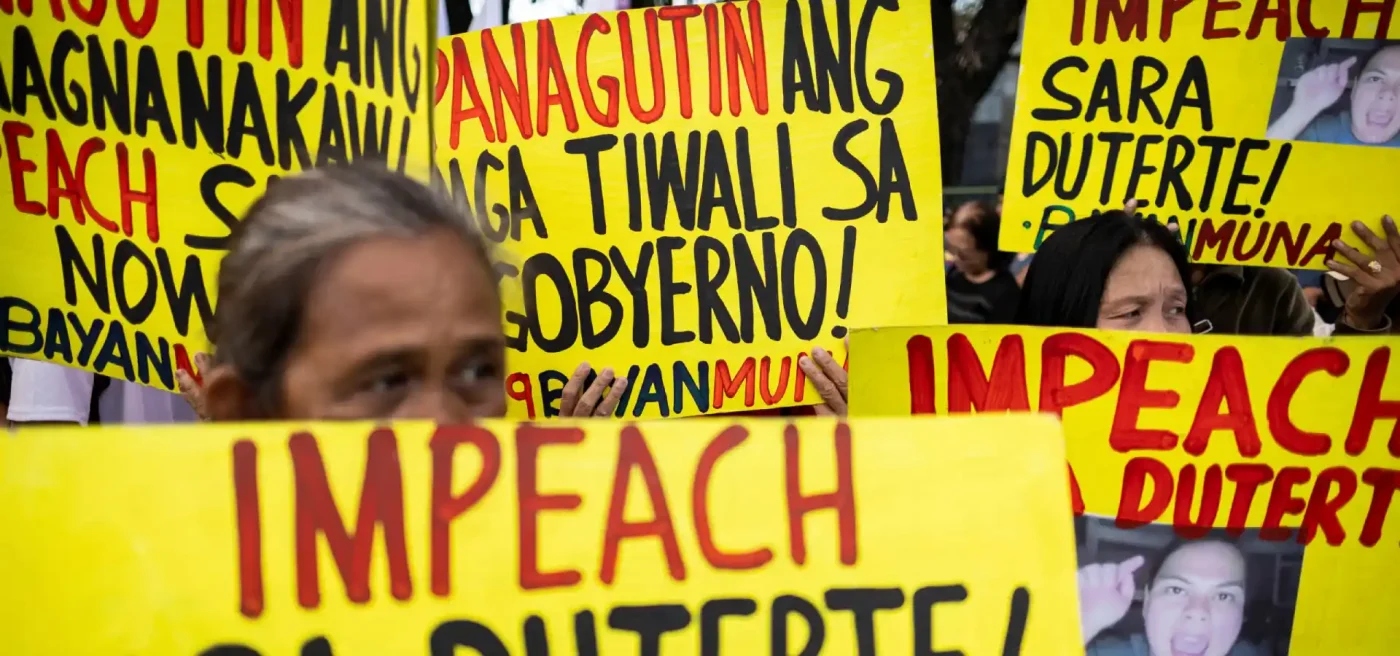In a landmark moment for Philippine politics, the Senate is gearing up for the impeachment trial of Vice President Sara Duterte, set to commence in late July. With allegations ranging from misuse of public funds to grave accusations of plotting violence against senior officials, the proceedings promise to be a defining test of accountability and democratic integrity in the country. As preparations intensify, Senate Secretary Renato Bantug has outlined the meticulous steps being taken to ensure a fair and transparent process, amidst a backdrop of political tension and public scrutiny.
Setting the Stage for a Historic Trial
The Senate’s preparations for the impeachment trial of Vice President Sara Duterte mark a significant chapter in the Philippines’ political history. Scheduled to begin on July 30, 2025, the trial follows months of mounting allegations against Duterte, culminating in seven articles of impeachment presented by at least one-third of the House of Representatives. Senate Secretary Renato Bantug, appointed as Clerk of Court for the impeachment court since February, has been at the forefront of organizing the procedural framework, ensuring that the Senate is ready to transform into a judicial body when Congress resumes on June 2.
On the opening day of the regular session, the Senate will formally receive the House prosecutors at 4 pm, who will read out the charges against Duterte in the session hall located on the second floor of the Senate building in Pasay City. Bantug detailed the protocol in a recent interview, explaining that the prosecution team will be escorted to the VIP gallery before being led to the well of the Senate to present their case. “When the Senate president acknowledges their presence, they will proceed with reading the articles of impeachment” said Bantug, emphasizing the procedural precision being adopted to maintain order and decorum.
The charges will be followed by the convening of the impeachment court on June 3, with Senate President Francis “Chiz” Escudero taking the oath as presiding officer. Escudero will also administer oaths to the senator-judges, who will don impeachment robes for the occasion. According to Bantug, the first day of the trial is expected to be brief, lasting just over an hour, and will primarily focus on issuing summons to set the proceedings in motion.
Grave Allegations Against Duterte
The seven articles of impeachment against Vice President Sara Duterte paint a damning picture of alleged misconduct, spanning betrayal of public trust, graft, corruption, and even high crimes. Among the most serious accusations is the claim that Duterte contracted an assassin and plotted to murder key figures, including President Ferdinand “Bongbong” Marcos Jr., First Lady Liza Araneta-Marcos, and House Speaker Martin Romualdez. This allegation stems from a public statement Duterte reportedly made during an online press briefing in November 2024, where she allegedly said, “I already talked to a person. I told the person, ‘If they kill me, kill Bongbong Marcos, Liza Araneta, and Martin Romualdez.’ No joke, no joke. I’ve left instructions.”
While the Palace has described this remark as an “active threat,” no definitive evidence has been publicly confirmed to substantiate the claim of a concrete plot. If verified, such an accusation could have profound implications for Duterte’s political career and the stability of the current administration. Other articles of impeachment include allegations of misuse and malversation of confidential funds during her tenure at the Office of the Vice President (OVP) and the Department of Education (DepEd), as well as charges of amassing unexplained wealth and failing to disclose assets in violation of the 1987 Philippine Constitution.
Further accusations point to bribery, acts of destabilization, and conspiracy to commit murder, alongside a broader claim that Duterte’s overall conduct as Vice President constitutes a betrayal of public trust. These charges, if proven, could not only lead to her removal from office but also set a precedent for how high-ranking officials are held accountable in the Philippines.
Procedural Roadmap and Public Access
The timeline for the impeachment trial has been carefully mapped out, with Senate President Escudero proposing a pre-trial period from June 3 to July 25. During this phase, administrative matters such as submissions will be handled through Bantug’s office, ensuring that procedural issues are addressed before the formal trial begins. With the 19th Congress concluding on June 30 and the 20th Congress opening on July 28, the trial will commence with a potentially new set of senator-judges on July 30.
To accommodate public interest in the proceedings, the Senate has arranged for a capacity of 340 individuals in the session hall, including guests, media, staff, and representatives from both the prosecution and defense teams. A Visitors Management System has been implemented, allowing guests to register and reserve seats online via a QR code system. “This ensures transparency and prevents accusations of favoritism in seating arrangements” said Bantug, highlighting the Senate’s commitment to fairness in managing public access to the trial.
Political Implications and Public Sentiment
The impeachment trial of Sara Duterte comes at a time of heightened political polarization in the Philippines. As the daughter of former President Rodrigo Duterte, Sara has long been a polarizing figure, with a political base that remains loyal to her family’s legacy. However, the gravity of the charges against her has sparked intense debate about the integrity of public office and the mechanisms of accountability within the government. Analysts suggest that the outcome of the trial could reshape the political landscape, either reinforcing trust in democratic institutions or deepening public disillusionment if the process is perceived as biased or politically motivated.
Public sentiment, as reflected in discussions on platforms like X, appears divided. While some Filipinos express outrage over the allegations, particularly regarding the misuse of funds and threats of violence, others view the impeachment as a targeted attack by political rivals. The Senate’s handling of the trial will be crucial in maintaining public confidence, especially given the high stakes involved. Beyond Duterte’s individual fate, the proceedings may influence how future administrations address issues of corruption and abuse of power.
Historical Context and Regional Relevance
The Philippines has a history of high-profile impeachment trials, most notably that of former President Joseph Estrada in 2001, which led to his ouster following mass protests known as EDSA II. While Duterte’s case differs in scope and context, it echoes past instances where political accountability has been tested through constitutional mechanisms. The current trial also holds significance for the broader Southeast Asian region, where democratic institutions often face challenges from entrenched political dynasties and allegations of corruption.
In a region where political stability is frequently fragile, the Philippines’ approach to this impeachment could serve as a benchmark for neighboring countries grappling with similar issues. Nations like Thailand and Indonesia, which have faced their own political crises in recent years, may look to the Philippine Senate’s process as a model—or a cautionary tale—of how to balance justice with political sensitivities. For now, the eyes of the region are on Manila, as the Senate prepares to navigate uncharted waters in this historic trial.
Challenges Ahead for the Senate
As the impeachment court convenes, the Senate faces numerous challenges in ensuring that the trial remains impartial and credible. The allegations against Duterte are not only serious but also deeply personal, given the involvement of other high-ranking officials in the alleged threats. Maintaining neutrality will be paramount, especially as senator-judges weigh evidence that could have far-reaching consequences for the country’s leadership. Additionally, logistical issues, such as managing public access and media coverage, will test the Senate’s capacity to handle a trial of this magnitude.
Legal experts have also raised questions about the strength of the evidence supporting the articles of impeachment. While public statements and financial discrepancies have been cited, much of the case may hinge on witness testimonies and documentary proof, which have yet to be fully disclosed. If the prosecution fails to substantiate the more severe charges, such as conspiracy to commit murder, the trial could risk being perceived as a political vendetta rather than a genuine pursuit of justice.
Looking Forward
As the Philippine Senate finalizes its preparations for the impeachment trial of Vice President Sara Duterte, the nation braces for a process that could redefine its political future. The coming months will reveal whether the charges against Duterte hold under scrutiny, and how the Senate’s actions shape public trust in governance. For now, the stage is set for a historic reckoning—one that will test the resilience of democratic institutions and the resolve of a country seeking accountability at the highest levels of power.
















